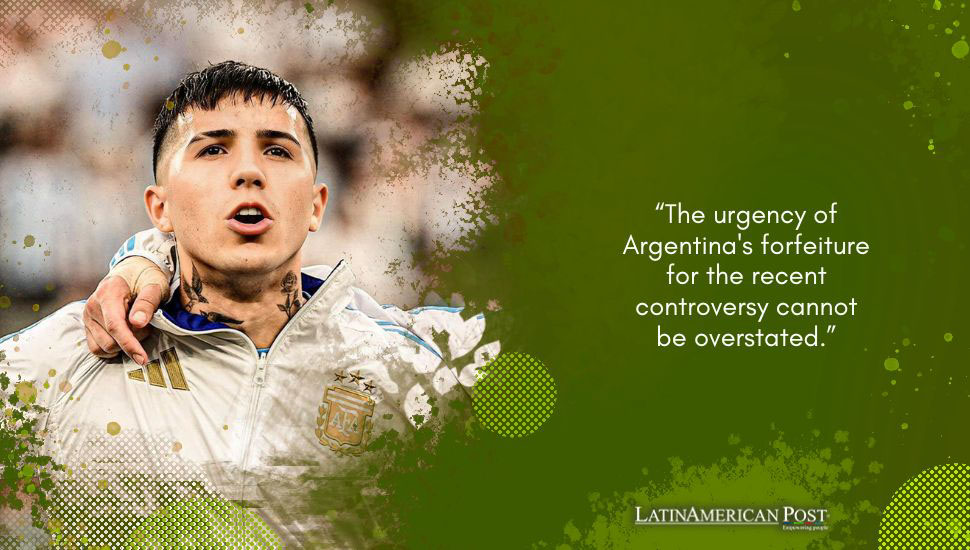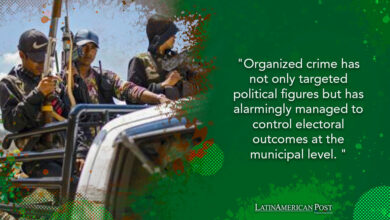FIFA’s Zero Tolerance on Racism: Should Argentina Forfeit Copa America Title?

FIFA president Gianni Infantino recently called for teams to forfeit matches due to racist actions by their supporters. The urgency of Argentina’s forfeiture for the recent controversy cannot be overstated.
The recent incident involving Argentina’s national team and the fallout from racist chants in a celebratory video posted by Enzo Fernandez has not only sparked significant controversy locally but also garnered international attention. This has led to disciplinary action from Chelsea and a legal complaint from the French Football Federation (FFF). The episode raises the question: should Argentina forfeit its Copa America victory in line with FIFA president Gianni Infantino’s zero-tolerance policy on racism?
Infantino’s Stand on Racism and Argentina’s Dilemma
Gianni Infantino, the president of FIFA, has been vocal about eradicating racism in soccer. He advocates for stringent measures, including match forfeitures, when fans or players commit acts of racism that lead to the abandonment of a game. The Argentina team incident should be noticed if this policy is to be enforced consistently.
The video, which surfaced on social media, shows Fernandez and other Argentina players chanting a song with racist undertones directed at France’s black and mixed-race players. This incident occurred during their celebrations after winning the Copa America. The offensive nature of the chants has led to widespread condemnation and disciplinary actions against Fernandez, who has since apologized for his involvement.
The French Football Federation filed a legal complaint with FIFA, demanding accountability for the discriminatory remarks. The FFF’s president, Philippe Diallo, emphasized that such behavior contradicts the values of sport and human rights. This strong stance underscores the necessity for FIFA to take decisive action in line with its policies.
Latin American Context: Racism in Soccer
Racism in soccer is not confined to Europe; it is a pervasive issue affecting Latin America. The region, known for its passionate soccer culture, has seen its share of racist incidents both on and off the field. Players of African descent, Indigenous players, and those from minority backgrounds often face discrimination and abuse. Understanding and addressing these issues in the Latin American context is crucial in the global fight against racism in soccer.
In Argentina, racism is deeply intertwined with the country’s social and historical context. The nation prides itself on its soccer prowess and passionate fans, but this enthusiasm sometimes turns into unacceptable behavior. The chants in the video reflect a broader problem within Argentine society and its soccer culture.
Latin American soccer federations must grapple with these issues and work towards creating an inclusive environment. The incident involving the Argentina national team serves as a stark reminder of the need for continuous education and stringent measures to combat racism in all forms.
FIFA’s Role and the Call for Accountability
FIFA is responsible for enforcing its zero-tolerance policy on racism uniformly across all its member associations. The organization’s credibility hinges on its ability to address such incidents decisively. Infantino’s commitment to relaunching a task force to monitor racist incidents is a step in the right direction, but actions must speak louder than words.
The controversy surrounding Argentina’s team highlights the need to apply FIFA’s policies consistently. If teams are to forfeit matches due to racist behavior by their supporters, then the same principle should apply to players and team officials. Fernandez’s actions and those of his teammates should be scrutinized under the same standards that would apply to fans.
Chelsea’s disciplinary proceedings against Fernandez demonstrate a proactive approach to addressing the issue within the club. However, FIFA’s intervention is necessary to set a global precedent. By holding Argentina accountable, FIFA can send a clear message that racism has no place in soccer and that any violation will be met with severe consequences.
Moving Forward: Education and Prevention
The incident underscores the need for comprehensive education programs to address racism in soccer. Players, coaches, and fans must be educated about the impact of their actions and the importance of respecting all individuals regardless of their background. Such programs should be implemented at all levels of the sport, from grassroots to professional leagues.
These educational initiatives are particularly crucial in Latin America, where soccer is a significant part of the cultural fabric. The region’s soccer authorities must collaborate with FIFA and other international organizations to develop and implement effective anti-racism strategies. These efforts should include workshops, campaigns, and community outreach programs to promote inclusivity and diversity.
Furthermore, preventive measures such as stricter penalties for racist behavior and improved monitoring systems at matches are essential. Technology can play a significant role in identifying and addressing incidents of racism in real time. Soccer authorities can ensure that perpetrators are held accountable promptly by leveraging advancements in surveillance and reporting.
A Call for Consistency and Justice
In conclusion, the recent incident involving Argentina’s national team and the subsequent actions taken by various soccer authorities highlight the ongoing battle against racism in the sport. FIFA President Gianni Infantino’s zero-tolerance policy must be applied consistently to maintain the integrity of the sport and uphold its values.
If teams are to forfeit matches due to the racist actions of their supporters, then Argentina’s forfeiture should be seriously considered. This would set a precedent and demonstrate that FIFA is committed to eradicating racism from soccer. However, assessing the potential impact on the players and the team’s reputation is essential. It would also serve as a potent reminder that discrimination, in any form, is unacceptable and will not be tolerated.
Also read: Leadership Failures Fuel Persistent Soccer Violence Across Latin America
By taking decisive action, FIFA can lead the way in fostering a more inclusive and respectful environment within soccer. The journey towards eliminating racism is long and challenging, but with consistent efforts and unwavering commitment, it is a goal that can be achieved. The time for change is now, and it starts with holding everyone accountable, from fans to players and officials. This collective responsibility is crucial in our fight against racism in soccer.





